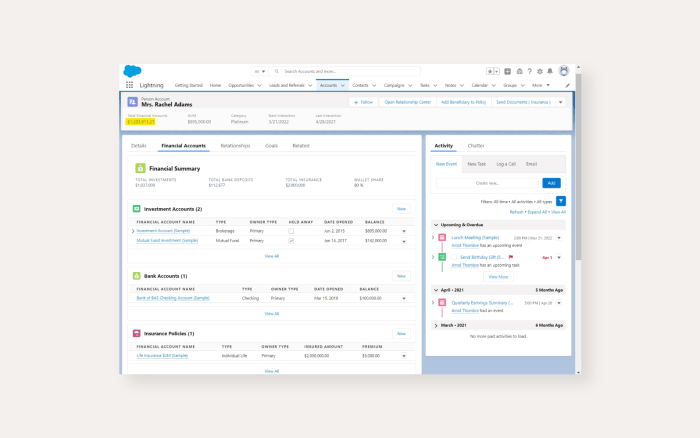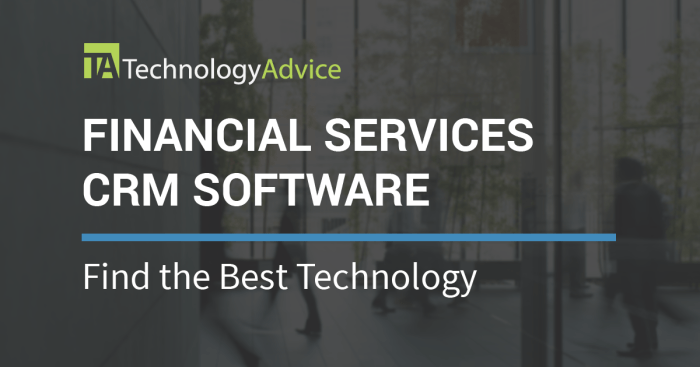Crm software for financial services industry – The financial services industry operates on trust, efficiency, and personalized service. Customer Relationship Management (CRM) software plays a pivotal role in achieving these goals, streamlining operations, and fostering stronger client relationships. This comprehensive guide delves into the specifics of CRM software tailored for financial institutions, exploring its features, benefits, and considerations for successful implementation.
Understanding the Unique Needs of Financial Services
Financial services present unique challenges and opportunities for CRM implementation. Unlike other industries, the financial sector operates under stringent regulatory compliance requirements, demanding robust security measures and data privacy protocols. Client data, including financial transactions and personal information, is highly sensitive and requires meticulous protection. Furthermore, the industry demands a high level of personalization, with clients expecting tailored financial advice and proactive service.

Source: cloudfront.net
Key Considerations for Financial CRM Software:, Crm software for financial services industry
- Security and Compliance: The software must adhere to regulations like GDPR, CCPA, and industry-specific compliance standards (e.g., FINRA, SEC).
- Data Privacy: Robust encryption, access controls, and audit trails are crucial for protecting sensitive client data.
- Integration Capabilities: Seamless integration with existing financial systems (e.g., core banking systems, payment gateways) is essential for efficient data flow.
- Personalization and Client Segmentation: The CRM should enable targeted marketing and personalized service based on client profiles and financial needs.
- Reporting and Analytics: Comprehensive reporting and analytics capabilities are needed to track key performance indicators (KPIs) and gain valuable insights into client behavior.
- Workflow Automation: Automating tasks such as onboarding, KYC/AML compliance checks, and account management can significantly improve efficiency.
Key Features of Financial Services CRM Software: Crm Software For Financial Services Industry
Effective CRM software for financial services goes beyond basic contact management. It incorporates features designed to address the industry’s unique requirements. These features include:
Core Features:
- 360-Degree Client View: A consolidated view of all client interactions, transactions, and financial information.
- Lead Management: Tools for capturing, qualifying, and nurturing leads, ensuring efficient conversion rates.
- Contact Management: Centralized storage and management of client contact information, including communication history.
- Sales Force Automation (SFA): Streamlining sales processes, including opportunity tracking and forecasting.
- Marketing Automation: Automated email campaigns, personalized messaging, and targeted marketing efforts.
- Customer Service Management: Tools for managing client inquiries, resolving issues, and providing support.
- Regulatory Compliance Features: Built-in tools to ensure adherence to relevant regulations and compliance standards.
- KYC/AML Compliance: Automated checks to verify client identity and prevent money laundering.
- Document Management: Secure storage and retrieval of important client documents.
- Reporting and Analytics Dashboard: Provides real-time insights into sales performance, customer behavior, and other key metrics.
Benefits of Implementing CRM in Financial Services
Implementing a robust CRM system offers significant advantages for financial institutions of all sizes:
- Improved Customer Satisfaction: Personalized service and proactive support enhance client loyalty.
- Increased Efficiency and Productivity: Automation of tasks frees up staff to focus on high-value activities.
- Enhanced Sales Performance: Improved lead management and sales force automation drive revenue growth.
- Reduced Operational Costs: Streamlined processes and improved efficiency lead to cost savings.
- Better Risk Management: Robust security and compliance features mitigate risks associated with data breaches and regulatory violations.
- Improved Regulatory Compliance: Built-in compliance features help organizations meet regulatory requirements.
- Data-Driven Decision Making: Comprehensive reporting and analytics provide valuable insights for strategic planning.
- Strengthened Client Relationships: Personalized communication and proactive service build stronger client relationships.
Choosing the Right CRM Software for Your Financial Institution
Selecting the appropriate CRM solution requires careful consideration of various factors:
- Size and Structure of Your Institution: The CRM should scale to accommodate your current and future needs.
- Specific Business Needs: Identify the key functionalities and features that align with your institution’s goals.
- Budgetary Constraints: Consider the total cost of ownership, including licensing fees, implementation costs, and ongoing maintenance.
- Integration Capabilities: Ensure seamless integration with existing systems.
- Vendor Reputation and Support: Choose a reputable vendor with a proven track record and reliable customer support.
- Security and Compliance: Verify that the software meets all relevant security and compliance standards.
Examples of CRM Software for Financial Services
Several reputable vendors offer CRM solutions specifically designed for the financial services industry. These include (but are not limited to): Salesforce Financial Services Cloud, Microsoft Dynamics 365 for Finance, and several niche players catering to specific segments within the industry. Researching and comparing different options based on your specific requirements is crucial.
Frequently Asked Questions (FAQ)
- Q: What is the cost of implementing a CRM system? A: The cost varies depending on the chosen software, implementation complexity, and customization requirements. It’s essential to obtain detailed quotes from vendors.
- Q: How long does it take to implement a CRM system? A: Implementation timeframes vary, depending on the size and complexity of the project. It can range from a few weeks to several months.
- Q: What are the key metrics to track after CRM implementation? A: Key metrics include customer satisfaction, sales conversion rates, lead generation, customer churn, and operational efficiency.
- Q: How can I ensure data security and compliance with a CRM system? A: Choose a vendor with robust security features, implement strict access controls, and regularly audit your system for vulnerabilities.
- Q: What is the return on investment (ROI) of a CRM system? A: ROI can be significant, resulting from improved efficiency, increased sales, enhanced customer satisfaction, and reduced operational costs. Accurate ROI calculation requires careful tracking of key metrics.
Conclusion
CRM software is no longer a luxury but a necessity for financial institutions seeking to thrive in today’s competitive landscape. By carefully selecting and implementing a suitable CRM system, financial services organizations can enhance customer relationships, streamline operations, improve compliance, and ultimately drive growth and profitability. The key is to thoroughly assess your institution’s specific needs and choose a solution that aligns with your long-term strategic goals.
Call to Action
Ready to transform your financial institution’s client relationships and operational efficiency? Contact us today for a free consultation to discuss your CRM needs and explore the best solutions for your business.
Essential Questionnaire
What are the key features of a good CRM for financial services?
Key features include robust security, compliance with relevant regulations, integration with existing financial systems, advanced reporting and analytics capabilities, and tools for personalized client communication.
How much does CRM software for financial services cost?
Pricing varies greatly depending on the size of the institution, the features required, and the vendor. Expect a range from subscription-based models to large-scale enterprise solutions with significant upfront investment.
What are the common challenges in implementing a CRM system in finance?
Common challenges include data migration, integration with legacy systems, user adoption, and ensuring compliance with data privacy regulations.

Source: technologyadvice.com
How can I measure the ROI of a CRM implementation?
ROI can be measured by tracking improvements in customer satisfaction, increased sales conversion rates, reduced operational costs, and enhanced efficiency in client service and support.
